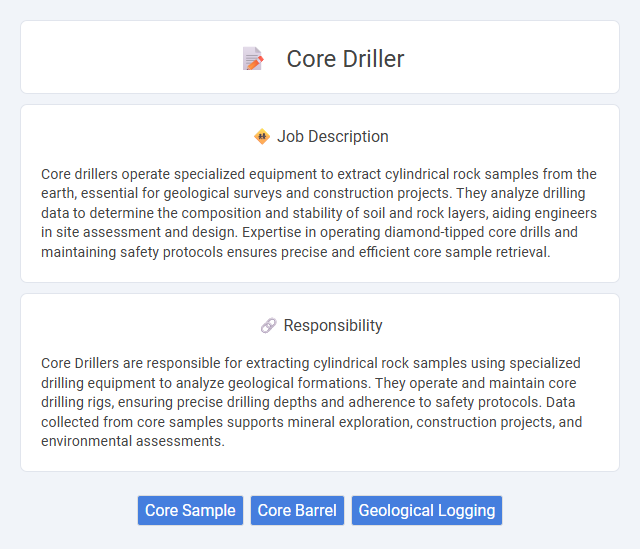
Core drillers operate specialized equipment to extract cylindrical rock samples from the earth, essential for geological surveys and construction projects. They analyze drilling data to determine the composition and stability of soil and rock layers, aiding engineers in site assessment and design. Expertise in operating diamond-tipped core drills and maintaining safety protocols ensures precise and efficient core sample retrieval.
Core drilling work likely suits individuals with strong physical stamina and the ability to work in challenging outdoor environments, as the job often involves handling heavy machinery and exposure to varying weather conditions. Those who can maintain focus under repetitive tasks and have a good understanding of safety protocols may find the role more manageable and rewarding. People with pre-existing health issues or those who struggle with physical labor might find this profession less suitable due to its demanding nature.
Qualification
A core driller must possess strong technical skills, including proficiency in operating drilling machinery and interpreting geological data for accurate core sampling. Qualifications typically require a high school diploma or GED, supplemented by vocational training or certification in drilling technology, safety procedures, and equipment maintenance. Relevant experience in the construction, mining, or geological exploration industries significantly enhances a core driller's ability to perform precise drilling tasks under various environmental conditions.
Responsibility
Core Drillers are responsible for extracting cylindrical rock samples using specialized drilling equipment to analyze geological formations. They operate and maintain core drilling rigs, ensuring precise drilling depths and adherence to safety protocols. Data collected from core samples supports mineral exploration, construction projects, and environmental assessments.
Benefit
Core drilling jobs probably offer significant benefits such as competitive salaries that reflect the specialized skills required. Workers may experience reliable job stability due to consistent demand in construction, mining, and engineering projects. Health and safety training provided is likely to enhance workplace security and reduce risk, contributing to overall job satisfaction.
Challenge
Core drilling likely presents significant challenges involving precision and endurance, as operators must navigate tough materials with specialized equipment. The probability of encountering unpredictable underground conditions could demand quick problem-solving and adaptability. Safety risks and equipment maintenance also seem probable aspects requiring constant attention to ensure successful project completion.
Career Advancement
Core Drillers gain specialized skills in extracting geological samples, positioning themselves for advancement into supervisory roles or geological technician positions. Mastery of drilling techniques and safety protocols enhances opportunities for career growth within mining, construction, and environmental sectors. Continuous training and certification in advanced drilling technology further increase prospects for leadership and project management responsibilities.
Key Terms
Core Sample
Core Drillers extract cylindrical core samples from underground formations using specialized drilling equipment to analyze the composition, structure, and properties of rock layers. These core samples provide critical geological data for mining, oil and gas exploration, and environmental studies, enabling accurate subsurface assessments. Precision in core recovery and sample preservation is essential to ensure reliable laboratory analysis and informed decision-making in resource development.
Core Barrel
Core Drillers specialize in extracting cylindrical sections of rock or soil using a core barrel, a crucial component designed to capture intact core samples for geological analysis. The core barrel consists of a hollow tube with a cutting edge that preserves the sample's structural integrity during drilling. Precision in handling and maintaining the core barrel directly impacts the quality and accuracy of subsurface data collected in mining, construction, and environmental projects.
Geological Logging
Core drillers specialize in extracting cylindrical rock samples from underground formations for detailed analysis. Geological logging involves meticulously examining core samples to record lithology, mineral content, structural features, and any signs of alteration or mineralization. Accurate geological logging supports resource estimation, mineral exploration, and geotechnical assessments by providing critical data on subsurface conditions.
 kuljobs.com
kuljobs.com